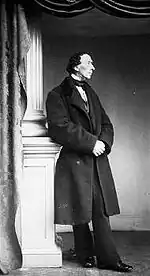Rudolph Striegler
Peter Ludvig Rudolph Striegler (4 October 1816 – 24 January 1876) was one of Denmark's early photographers, specialising in portrait photography.

Trained as a picture-framer, Strieger opened Odense's first daguerreotype studio in 1846. With his experience of gold-plating, he was able to combine photography with ornate framing. Until 1857, he travelled widely around the country until he finally moved to Copenhagen.[1]
In 1860, he introduced carte-de-visite photography to Denmark.[2] The idea of using a photograph instead of a printed visiting card came from France where it was patented by André Adolphe Eugène Disdéri in 1854 with a four-lensed camera which could take from eight to twelve photographs on the same glass negative. As the prints could be collected in albums, the technique became extremely popular.[3]
In 1861, while court photographer, he was awarded the Ingenio et Arti medal.[4]
He was also one of the early photographers who took portraits of Hans Christian Andersen. In his diary entry for 22 October 1861, Andersen writes: "Stood for Siegler until 11.30 and had a few large and small pictures taken of me."[5]
References
- Dansk Fotografihistorie, ed. Mette Sandbye. Gyldendal, Copenhagen. 2004. p. 33. ISBN 87-00-39586-2
- John Hannavy: Encyclopedia of nineteenth-century photography, Volume 1. From Google Books Retrieved 10 February 2010.
- Verden set på ny. From Det nationale Fofomuseum. (in Danish) Retrieved 10 February 2010.
- Medaljen Ingenio et arti. From Litteraturpriser.dk. Retrieved 10 February 2010.
- H.C. Andersens dagbøger, 21–22 October 1861. (in Danish) Retrieved 10 February 2010.